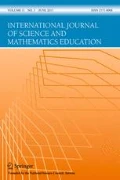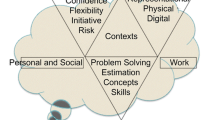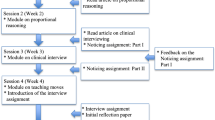Abstract
Attention to mathematical reasoning in curriculum standards is part of an international trend, but identifying and understanding reasoning continues to challenge teachers.We report on one component of an Australia-wide initiative supporting teachers to implement innovative pedagogies. This paper contains insights from design research that focused on trialling classroom materials to support elementary teachers in their planning and assessment of mathematical reasoning. Findings confirmed planning is a critical step to developing learning experiences that elicit student reasoning, including consideration to task modifications and teacher questioning. Teachers’ capacity to assess their students’ reasoning was explored using the purposefully designed Assessing Mathematical Reasoning Rubric. The results reveal the complexity involved in constructing accurate judgements of students’ reasoning capabilities, particularly appreciating the non-linear nature of mathematical reasoning and the need to draw on multiple sources of evidence. Implications for supporting teachers in their planning for, and assessing of, mathematical reasoning are raised.



Similar content being viewed by others
Notes
Pseudonyms used throughout
References
Anthony, G., & Walshaw, M. (2009). Effective pedagogy in mathematics. In Educational series—19. Brussels: International Bureau of Education, Geneva.
Askew, M., Brown, M., Rhodes, V., Wiliam, D., & Johnson, D. (1997). Effective teachers of numeracy: Report of a study carried out for the Teacher Training Agency. London, England: King’s College, University of London.
Australian Government Department of Education and Training. (2017). reSolve: Maths by Inquiry. Retrieved from http://www.resolve.edu.au/
Australian Curriculum Assessment and Reporting Authority. (2012). Development of the Australian Curriculum. Retrieved from http://www.acara.edu.au/verve/_resources/The_Shape_of_the_Australian_Curriculum_V3.pdf
Australian Curriculum Assessment and Reporting Authority. (2017). The Australian Curriculum: Mathematics: Key Ideas. Retrieved from http://www.australiancurriculum.edu.au https://www.australiancurriculum.edu.au/f-10-curriculum/mathematics/key-ideas/
Ball, D. L., Thames, M. H., & Phelps, G. (2008). Content knowledge for teaching: What makes it special? Journal of Teacher Education, 59, 389–407.
Brodie, K. (2010). Teaching mathematical reasoning in secondary school classrooms. New York, NY: Springer.
Boaler, J. (2002). Learning from teaching: Exploring the relationship between reform curriculum and equity. Journal for Research in Mathematics Education, 33(4), 239–258.
Clarke, D.J. (2011). Open-ended tasks and assessment: The nettle or the rose. In B. Kaur & K. Y. Wong (Eds.), Assessment in the mathematics classroom yearbook 2011 (pp. 131–163). Singapore: World Scientific Publishing.
Clarke, D. J., Clarke, D. M., & Sullivan, P. (2012a). How do mathematics teachers decide what to teach? Australian teachers. Australian Primary Mathematics Classroom, 17(3), 9–12.
Clarke, D. M., Clarke, D. J., & Sullivan, P. (2012b). Reasoning in the Australian curriculum: Understanding its meaning and using the relevant language. Australian Primary Mathematics Classroom, 17(3), 28–32.
Davidson, A. (2017). Exploring ways to improve teachers' Mathematical Knowledge for Teaching with effective team planning practices. In A. Downton, S. Livy, & J. Hall (Eds.), 40 years on: We are still learning! Proceedings of the 39th annual conference of the Mathematics Education Research Group of Australasia (pp. 205-212). Melbourne: MERGA.
Gravemeijer, K., & Cobb, P. (2006). Design research from a learning design perspective. In J. Van Den Akker, K. Gravemeijer, S. McKenney, & N. Nievenn (Eds.), Educational design research (pp. 17–51). Oxon, England: Routledge.
Herbert, S., Vale, C., Bragg, L. A., Loong, E., & Widjaja, W. (2015). A framework for primary teachers’ perceptions of mathematical reasoning. International Journal of Educational Research, 74, 26-37.
Hunter, R. (2006). Structuring the talk towards mathematical inquiry. In P. Grootenboer, R. Zevenbergen, & M. Chinnappan (Eds.), Identities, cultures and learning spaces: proceedings of the 29th annual conference of the mathematics education research group of Australasia (pp. 309–317). Adelaide, Australia: MERGA.
Jacobs, V. R., Lamb, L. L. C., & Philipp, R. A. (2010). Professional noticing of children’s mathematical thinking. Journal for Research in Mathematics Education, 41(2), 169–202.
Jeannotte, D., & Kieran, C. (2017). A conceptual model of mathematical reasoning for school mathematics. Educational Studies in Mathematics, 96(1), 1–16.
Kilpatrick, J., Swafford, J., & Findell, B. (Eds.). (2001). Adding it up: Helping children learn mathematics. Washington, DC: National Academy Press.
Kelly, A. (2003). Research as design. Educational Researcher, 32(1), 3–4.
Lannin, J., Ellis, A., & Elliott, R. (2011). Developing essential understanding of mathematical reasoning for teaching mathematics in prekindergarten—grade 8. Reston, VA: National Council of Teachers of Mathematics.
Loong E. Y-K, Vale, C., Herbert, S., Bragg, L. A., Widjaja, W. (2017). Tracking change in primary teachers' understanding of mathematical reasoning through demonstration lessons. Mathematics Teacher Education and Development, 19(1), 5-29.
Martino, A. M., & Maher, C. A. (1999). Teacher questioning to promote justification and generalization in mathematics: What research practice has taught us. The Journal of Mathematical Behavior, 18(1), 53–78.
Mason, J. (2003). On structure of attention in the learning of mathematics. The Australian Mathematics Teacher, 59(4), 17–25.
McCutcheon, G. (1980). How do elementary school teachers plan? The nature of planning and influences on it. The Elementary School Journal, 81(1), 4–23.
Ministry of Education Singapore. (2012). Mathematics syllabus primary one to five. Retrieved from https://www.moe.gov.sg/docs/.../primary_mathematics_syllabus_pri1_to_pri5.pdf.
Morgan, C., Tsatsaroni, A., & Lerman, S. (2002). Mathematics teachers’ positions and practices in discourses of assessment. British Journal of Sociology of Education, 23(3), 445–461.
Morris, D. (2009). Representations that enable children to engage in deductive argument. In D. A. Stylianou, M. L. Blanton, & E. J. Knuth (Eds.), Teaching and learning proof across the grades (pp. 87–101). New York, NY: Routledge.
Moon, J. (1997). Developing judgement: Assessing children’s work in mathematics. Portsmouth, NH: Heinemann.
Mutton, T., Hagger, H., & Burn, K. (2011). Learning to plan, planning to learn: The developing expertise of beginning teachers. Teachers and Teaching: Theory and Practice, 17(4), 399–416.
National Council of Teachers of Mathematics. (2017a). Supporting the common core state standards for mathematics. Retrieved from http://www.nctm.org/Standards-and-Positions/Position-Statements/Supporting-the-Common-Core-State-Standards-for-Mathematics/.
National Council of Teachers of Mathematics. (2017b). Principles and standards for school mathematics: Processes. Retrieved from http://www.nctm.org/Standards-and-Positions/Principles-and-Standards/Process/.
Reid, D. A., & Zack, V. (2009). Aspects of teaching proving in upper elementary school. In D. A. Stylianou, M. L. Blanton, & E. J. Knuth (Eds.), Teaching and learning proof across the grades (pp. 133–146). New York, NY: Routledge.
Roche, A., Clarke, D. M., Clarke, D. J., & Sullivan, P. (2014). Primary teachers’ written unit plans in mathematics and their perceptions of essential elements of these. Mathematics Education Research Journal, 26(4), 853–870.
Roche, A., Clarke, D. M., Clarke, D. J., & Chan, M. C. E. (2016). Learning from lessons: Teachers’ insights and intended actions arising from their learning about student thinking. In B. White, M. Chinnappan, & S. Trenholm (Eds.), Opening up mathematics education research. Proceedings of the 39th annual conference of the Mathematics Education Research Group of Australasia, (pp. 560–567). Adelaide, Australia: MERGA.
Rogers, K. C., & Steele, M. D. (2016). Graduate teaching assistants’ enactment of reasoning-and-proving tasks in a content course for elementary teachers. Journal for Research in Mathematics Education, 47(4), 372–419.
Schifter, D. (2009). Representation-based proof in the elementary grades. In D. A. Stylianou, M. L. Blanton, & E. J. Knuth (Eds.), Teaching and learning proof across the grades (pp. 71–86). New York, NY: Routledge.
Stacey, K. (2010). Mathematics teaching and learning to reach beyond the basics. In C. Glascodine & K.-A. Hoad (Eds.), Teaching mathematics? Make it count: What research tells us about effective mathematics teaching and learning (pp. 17–20). Camberwell, Australia: ACER.
Stacey, K., & Vincent, J. (2009). Modes of reasoning in explanations in Australian eighth-grade mathematics textbooks. Educational Studies in Mathematics, 72(3), 271–288.
Stein, M. K., Grover, B., & Henningsen, M. (1996). Building students’ capacity for mathematical thinking and reasoning: An analysis of mathematical tasks used in reform classrooms. American Educational Research Journal, 33(2), 455–488.
Stein, M. K., Smith, M. S., Henningsen, M., & Silver, E. A. (2009). Implementing standards-based mathematics instruction: A casebook for professional development. New York, NY: Teachers College Press.
Sullivan, P. & Davidson, A. (2014). The role of challenging mathematical tasks in creating opportunities for student reasoning. In J. Anderson, M. Cavanagh & A. Prescott (Eds.), Curriculum in focus: Research guided practice: Proceedings of the 37th annual conference of the Mathematics Education Research Group of Australasia (pp. 605–612). Sydney: MERGA.
Sullivan, P., Borcek, C., Walker, N., & Rennie, M. (2016). Exploring a structure for mathematics lessons that initiate learning by activating cognition on challenging tasks. The Journal of Mathematical Behavior, 41, 159–170.
Sullivan, P., Clarke, D. J., & Clarke, D. M. (2012). Choosing tasks to match the content you are wanting to teach. Australian Primary Mathematics Classroom, 17(3), 24–27.
Sullivan, P., Clarke, D. J., Clarke, D. M., Farrell, L., & Gerrard, J. (2012). Processes and priorities in planning mathematics teaching. Mathematics Education Research Journal, 25(4), 457–480.
Sullivan, P., Mousley, J., & Jorgensen, R. (2009). Tasks and pedagogies that facilitate mathematical problem solving. In B. Kaur, Y. B. Har, & M. Kapur (Eds.), Yearbook of the Association of Mathematics Educators, (pp. 17–42). London, England: AME and World Scientific Publishing.
Watson, A. (2000). Mathematics teachers acting as informal assessors: Practices, problems and recommendations. Educational Studies in Mathematics, 41(1), 69–91.
Wilson, P. H., Mojica, G., & Confrey, J. (2013). Learning trajectories in teacher education: Supporting teachers’ understanding of students’ mathematical thinking. The Journal of Mathematical Behavior, 32, 103–121.
Yinger, R. J. (1980). A study of teacher planning. The Elementary School Journal, 80(3), 107–127.
Acknowledgements
We would like to acknowledge the Australian Government Department of Education and Training funding of the reSolve: Mathematics by Inquiry project via the Australian Academy of Science and the Australian Association of Mathematics Teachers and the project team from Deakin University: Professor Colleen Vale/Dr Sandra Herbert, Dr Leicha A. Bragg, Dr Esther Loong, Dr Wanty Widjaja and Aylie Davidson.
Author information
Authors and Affiliations
Corresponding author
Rights and permissions
About this article
Cite this article
Davidson, A., Herbert, S. & Bragg, L.A. Supporting Elementary Teachers’ Planning and Assessing of Mathematical Reasoning. Int J of Sci and Math Educ 17, 1151–1171 (2019). https://doi.org/10.1007/s10763-018-9904-0
Received:
Accepted:
Published:
Issue Date:
DOI: https://doi.org/10.1007/s10763-018-9904-0




